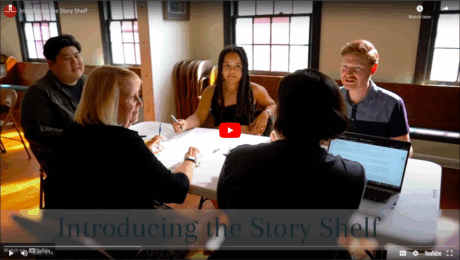Traveling the Tensions of Spiritual Entrepreneurship
Traveling the Tensions of Spiritual Entrepreneurship
A Note from Lake Institute
Today’s guest writers, Dustin Benac and Pat Bray, are part of a group of Christian theological educators and students who have spent this year exploring how their schools might effectively teach the art of ‘spiritual entrepreneurship.’ In January the group did a crazy thing, at least for January…. they got on a bus together and traveled from Chicago to New Orleans, visiting sites of spiritual innovation along the way. Read on to learn from Dustin and Pat’s experience of tensions at the heart of—and in the heartland of—spiritual entrepreneurship.
By Dustin Benac, Clinical Assistant Professor at Baylor University and Director and Cofounder of the Program for the Future Church & Pat Bray, Seminarian at George W. Truett Theological Seminary at Baylor University
A January snowfall in the Midwest blanketed the landscapes as a bus filled with Christian seminary professors and students made its way from Chicago to New Orleans. We had been brought together on that bus by the Teaching Spiritual Entrepreneurship Program, a special initiative funded by Trinity Wall Street, managed by Princeton Theological Seminary, and focused on making ‘spiritual entrepreneurship’ and its corollaries (Christian social innovation, social entrepreneurship, changemaking, etc.) more available in theological education. Our itinerary for this trip was filled with detours along the way to listen and learn from experts in the craft of faithful innovation, many of them profiled in Lake Institute’s Faithful Generosity Story Shelf.
We stopped on a Thursday evening beneath the Gateway Arch in St. Louis. After filing through the Visitor’s Center and taking our jackets off to pass through the metal detectors, we assembled in the cavern beneath the Arch. A symbol of the distinctly American sensibility of manifest destiny, the Arch is at once a literal gateway into exploration and innovation, and a reminder that attempts to change the world can easily commingle with logics of mastery, ownership, and conquest. Breathing in the tensions of this space–ever mindful of the complex histories we inhabit in the other communities we steward and serve–we began to sing. And then a guide along the way took the bread and juice she had brought with her through the metal detectors and repeated a simple-yet-profound refrain: “This is the body of Christ broken for you. This is the blood of Christ poured out for the forgiveness of your sins.” As we sang, we passed the elements, exchanging these holy-yet-ordinary gifts with one another.
In that moment and many others, we experienced what one of our guides, Larissa Kwong Abazia, calls inhabiting the tensions of ecclesial entrepreneurship. As we reflect on our journey, we want to name three of these tensions, all of them challenging and yet necessary, all of them doorways into the holy-yet-ordinary work of spiritual entrepreneurship.
Tension 1: Collaboration and Loneliness
The tension between collaboration and loneliness is a first striking feature of spiritual entrepreneurship. On our bus ride we encountered the goodness that comes from meaningful partnership and witnessed the power of teams, united in purpose and vision, to catalyze transformative work. Spiritual entrepreneurship is not the task of the lone innovator or the maverick visionary who toils in solitude. We learned how we are better together.
At the same time, we witnessed how much particularity and personhood enter into collaboration. Our individual stories shape the needs we see in the world, and our people, those with whom we are stitched together in the fabric of belonging, carry us and our work forward. Accordingly, we have purposefully written this reflection in a collaborative voice, but we also acknowledge the particularity of our own stories as we inhabit the tensions in which we stand. I (Pat) come to this place as a son, as a seminarian, a spiritual director, and a youth pastor journeying through the forest of both celebration and lament. I (Dustin) come to this place as a professor, as a father, as a husband, as a guide to spiritual entrepreneurship, as someone who knows both the joys of spiritual entrepreneurship and the isolation it can bring.
The journey of spiritual entrepreneurship may also take us down pathways of loneliness. Even as we often do this work for others and are drawn out by care for those we serve, our communities do not always develop a shared imagination for the innovations we carry. We may find ourselves leading alone, doing the work of faithful innovation with fewer people by our side. We do not want to dodge the discernment such solitude can bring, but we do want to tell the truth about the pathway into spiritual entrepreneurship: it will require learning how to receive the gift of collaboration, as well as becoming well acquainted with a form of loneliness that often leaves us feeling undone.
Tension 2: Celebration and Lament
While traveling across several states, I (Pat) found myself carrying, in one hand, the joyous celebration of creativity, while also holding the historical laments of Black pioneers along with the disappointment of our own fallen nature as humanity.
Our fifth day began in Nashville, where we practiced elevator pitches, viewed beautiful ministry sites, and gathered around tables sharing food and laughter, while leaving space for celebration of the imaginable and the unimaginable. The next morning, we made our way to Memphis, where we visited many Christian social innovation sites that prompted celebration and sparks of inspiration. However, there were moments that called our hearts to press pause.
As we drove through Memphis, our bus came to a stop on a street that appeared familiar. We stepped off the bus and glanced our hearts and eyes at the second level of the Lorraine Motel, where Dr. Martin Luther King Jr. was assassinated. A rush of emotions filled my chest and overflowed into my eye gates. Many paused to take pictures of the historical site and celebrate the life of Dr. King. At the same time, many paused in order that our hearts and minds would capture the not-so-beautiful Kodak moment, while yet wrestling with the question, “How much longer, Lord?” (Lam. 3:18).
This space activated memories of my grandfather telling me about his life when he brought me to this very place years ago. My heart didn’t know whether to celebrate Dr. King and other Black pioneers that pathed the way for me or to lament and cry because of the loss of life. In daily life, we live out the tension between celebration and lament. One day, we celebrate birthdays and holidays. And the next, we mourn mass shootings, racial injustices, and brokenness due to sin within our country. Our camera rolls may reflect the life we want, one that is filled with joy and celebration. But, deep inside, our hearts capture the reality of both celebration and lament.
Too often, tension is perceived as something to avoid and escape. However, I was reminded on this Christian social innovation journey that tension is itself a pathway to the holy. In social entrepreneurship, we have the ability to hold the tension of grief and joy. If we were to look at Jesus’ camera roll, I believe we would find him embracing the tension of celebration and lament. As the Christian gospel tells us, when Jesus entered Jerusalem on a donkey (during the “Triumphal Entry”), he held the difficult paradox of being “The one who comes in the name of the Lord!” and the “Son of Man who came not to be served but to serve, and to give his life as a ransom for many.” As Christians, we are invited into this beautiful and yet difficult paradox because Jesus, on the same day, experienced both lament and celebration.
Tension 3: Place and Displacement
This final tension, of place and displacement, takes us back to the complexity we encountered beneath the Gateway Arch. Spiritual entrepreneurship literally takes place: it is grounded, anchored, in the concrete material realities of lives and communities. As we journeyed from place to place on our way from Chicago to New Orleans, we witnessed how the wisdom of particular places infuses the form that spiritual entrepreneurship takes: local art covers the walls of an eatery in Dubuque, a sanctuary is repurposed as a hotel in Nashville, and the aftermath of a hurricane gives rise to a tool-sharing collective in New Orleans.
The particularity of these places draws our imaginations back to the specific places we love and serve, as well as those that have formed each of us in meaningful ways.
We are mindful that our own places, like the places we journey through, are layered with meaning, history, and significance. For example, the Arch where we stood carries a complex history, and we learned from experienced guides about the time it takes to really listen for and hear the story of a particular community. Even as place is an anchor for the practice of spiritual entrepreneurship, we have come to realize the places we inhabit and serve are also sites of ongoing learning, encounter, and repentance.
Along the way, we also learned how spiritual entrepreneurship may call us beyond the places we call home. In journeying together with classmates, friends, and professors, we experienced a sense of dislocation from the comforts of our communities and our people. We encounter a form of displacement as we found ourselves in unfamiliar communities and contexts. Although we did not all experience displacement in the same ways and in the same moments, we came to recognize how the wisdom of spiritual entrepreneurship is carried by places that we do not currently call home.
Where do we go from here?
These three tensions are unavoidable in the holy-and-ordinary work of spiritual entrepreneurship, which means they are also pathways into that work. These tensions may feel removed from our day-to-day lives and communities. But in reality, they confront each of us when we take the first step toward spiritual changemaking. The tension of collaboration and loneliness emerges as soon as we take the risk of sharing our ideas with others and asking who will come with us. The tension of celebration and lament arises when we find our first victory or feel the first sting of disappointment. And the tension of place and displacement becomes evident when we listen to the wisdom that emerges from our contexts.
In this way, through our individual and collective journey, we have learned that, while we cannot fully resolve the tensions of spiritual entrepreneurship, we can learn to inhabit them faithfully with others, in ways that answer the call we are hearing and make the work both fruitful and bearable.
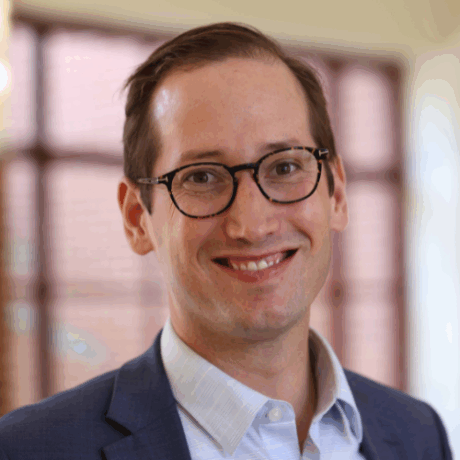
Dustin D. Benac is a professor, practical theologian, and organizational strategist. He teaches at Baylor University as a Clinical Assistant Professor and the director and cofounder of the Program for the Future Church. He is the author of Adaptive Church: Collaboration and Community in a Changing World (Baylor Press, 2022), coeditor of Pathways to Belonging (Cascade, 2025) and coeditor of Crisis and Care: Meditations on Faith and Philanthropy (Cascade, 2021). As an experienced fundraiser, speaker, and consultant, he has worked with congregations, educational institutions, nonprofits, students, and researchers across North America around matters of development, philanthropy, stewardship, and leading change. Benac earned his ThD from Duke University Divinity School.
 Patrick “Pat” Bray, a seminarian at George W. Truett Theological Seminary at Baylor University, is dedicated to nurturing resilient and healthy leaders. He emphasizes the power of storytelling, transparency, and embracing challenges as catalysts for transformative change. Drawing from his diverse experiences as a collegiate athlete, chaplain for Baylor Athletics, and The Baylor School of Business, Pat possesses a unique ability to inspire the next generation of youth and future leaders across the nation. Currently, he serves as a Youth Pastor, Spiritual Director, and Creative Writer of Slowly Inviting Truth (S.I.T.) – a newsletter that explores mental health, faith, and leadership.
Patrick “Pat” Bray, a seminarian at George W. Truett Theological Seminary at Baylor University, is dedicated to nurturing resilient and healthy leaders. He emphasizes the power of storytelling, transparency, and embracing challenges as catalysts for transformative change. Drawing from his diverse experiences as a collegiate athlete, chaplain for Baylor Athletics, and The Baylor School of Business, Pat possesses a unique ability to inspire the next generation of youth and future leaders across the nation. Currently, he serves as a Youth Pastor, Spiritual Director, and Creative Writer of Slowly Inviting Truth (S.I.T.) – a newsletter that explores mental health, faith, and leadership.
Expanded Perspective: An Invitation to Journey into Story
By Kelly Dunlap, Senior Program Manager at Lake Institute on Faith & Giving
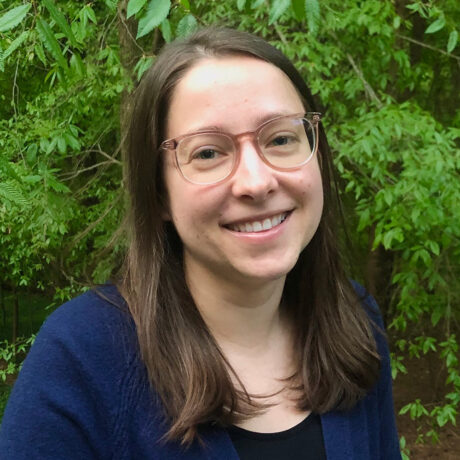
Part of the work of a pilgrim is to be surprised.
– Jim Forest, The Road to Emmaus
Each year, millions of people – followers of religious traditions and those merely in search of a re-centering experience – go on a pilgrimage. There are well-traveled routes, such as the Hajj to Mecca or the Camino de Santiago, which Lake staff have taken in summers past (you can read their reflections here). There are also many lesser-known journeys, like the bus trip that Dustin Benac and Pat Bray and their companions took to sites of spiritual entrepreneurship.
The beliefs and expectations that pilgrims carry with them will vary, but every pilgrimage involves an encounter with something unexpected. A pilgrim leaves behind the comfort of familiarity and takes one step after the other into new territory. Through this movement, pilgrims open themselves to seeing their own self, the divine, and the rest of creation in a new way.
The professors and students on the Teaching Spiritual Entrepreneurship pilgrimage sought wisdom outside of their own contexts, so they set out to hear and bear witness to stories of spiritual innovation. Through this, their hearts, minds, and imaginations were stirred.
You and I may not have the means or opportunity to take a spiritual pilgrimage right now, in which we physically relocate to new places for extended periods. But there are other ways to meaningfully transport ourselves to holy sites and to learn from faithful people.
By reading stories, we can immerse ourselves in a range of new places that bring with them new landscapes, cultures, struggles, and efforts to heal and restore. And by reading these stories in community, we have companions for the journey. Together, we can explore the meanings of a story, wrestle with its tensions, and maybe even dream of something new in our own place.
This is our hope for the Faithful Generosity Story Shelf, which holds stories of congregations and other religious groups who are innovating with their giving of funds, lands, property, and other resources. These stories are short enough to read and discuss during a committee meeting or other group gathering. If we engage with them as humble pilgrims, they might stir in our hearts and minds new ways to pursue faithfully generous and spiritually innovative projects in our own communities.
Will you visit the Story Shelf and select a story – or two – to read in your community? You might even “visit” some of the same sites as Dustin, Pat, and their companions. What tensions will arise for you and your community? What will surprise you? What will you dream?
How to Use the Faithful Generosity Story Shelf
Watch this video to learn more about Lake Institute’s Faithful Generosity Story Shelf and discover how congregations and religious groups are creatively using their assets and resources as an expression of faithful giving. Learn how to use these accessible vignettes to spark new questions, conversation, and ideas about how your community can make the most of the funds, buildings, land, and resources in your care.
Faithful Generosity Story Shelf Newsletter
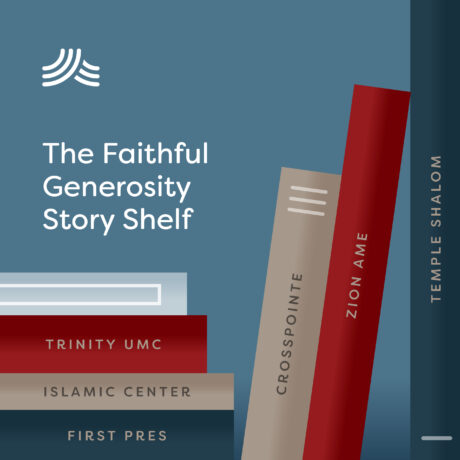
Want to stay in the loop on fresh stories of faithful generosity? Sign up for the Faithful Generosity Story Shelf newsletter and get a monthly update featuring the latest stories added to the collection. Be the first to explore new examples of how generosity shows up in communities of faith across the country.
We're Hiring: Managing Director
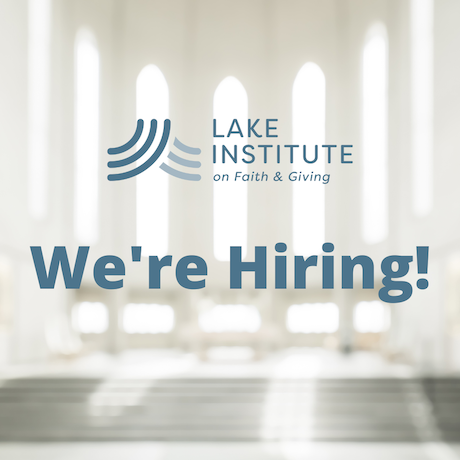
We’re hiring! Lake Institute on Faith & Giving – within the first-of-its-kind Indiana University Lilly Family School of Philanthropy – is now accepting applications for the full-time position of Managing Director in Indianapolis, Indiana. Visit our website to learn more and apply.
Watch Now: Lake Lecture 2025
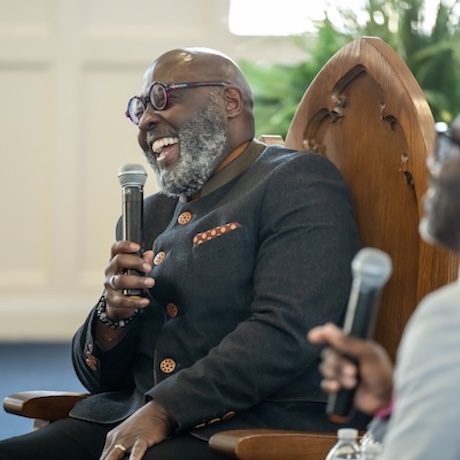
We were thrilled to see so many of you, both in person and online, at our 20th Annual Thomas H. Lake Lecture with Dr. Willie Jennings on Friday, April 11. The event is now available for you to view and share with others. If you attended and haven’t respond to the event survey yet, you’re invited to do that here.
Subscribe
Insights is a bi-weekly e-newsletter for the religious community and fundraisers of faith-based organizations that provides:
- Reflections on important developments in the field of faith and giving
- Recommended books, studies and articles
- Upcoming Lake Institute events


